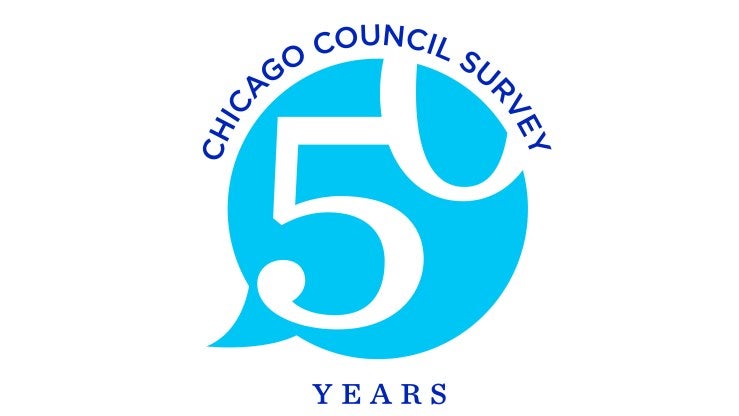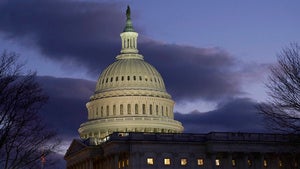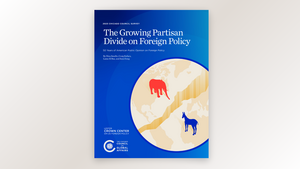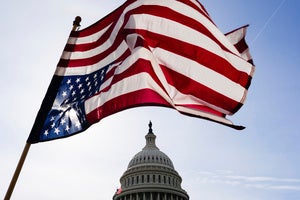While Democrats have grown more concerned than ever about weakening democracy at home, Republican worries have sharply declined.
In recent years, the combination of political polarization, contentious elections, and unchecked executive power in the United States have put American democracy at risk. Data from the 2025 Chicago Council Survey, fielded July 18–30, 2025, show weakening democracy is top of mind for most Americans, but Democrats and Independents are more likely to view it as a critical threat than Republicans.
Key Findings
- Nearly two-thirds (65%) of Americans view weakening democracy as a critical threat to the vital interests of the United States in the next 10 years.
- Democrats (82%) and Independents (63%) are far more likely than Republicans (49%) to see weakening democracy as a critical threat—a partisan gap that has grown by 33 percentage points since 2023.
- Three-quarters of Americans (73%) say democracy is preferable to any other kind of government, but some think that authoritarian regimes can be preferable in some cases (15%) or do not think it matters to them at all (10%).
Weakening Democracy Among Top Two Most Critical Threats to United States
Out of a broad range of potential threats to the United States, weakening democracy and government corruption stand out as the two most critical to American interests in the next decade. Nearly two-thirds of Americans (65%) think weakening democracy poses a critical threat to the United States, while an additional 25 percent think it is an important but not quite critical threat. Just one in 10 Americans do not view weakening democracy as an important threat at all (9%).
The data suggest that partisans see democratic erosion very differently: far more Democrats (82%) and Independents (63%) than Republicans (49%) view the weakening of democracy as a critical threat to the United States in the next decade. There are some differences within the parties as well. For instance, Liberal Democrats are more likely than Moderate Democrats to think that this is a critical threat (88% vs. 74%, respectively).1Yet MAGA and non-MAGA Republicans view the threat of weakening democracy at similar levels (47% and 52%).2
Of the broad range of potential threats to the United States, democratic erosion and government corruption are considered the most critical by Democrats, while Republicans rank them lower on their list. Instead, Republicans prioritize issues like the large numbers of immigrants and refugees coming into the United States, the development of China as a world power, international terrorism, and Iran’s nuclear program, reflecting a focus on external and security-related concerns rather than domestic, political risks.
"The three equal branches of government are getting blurred and checks and balances are almost non-existent."
For Democrats and many Independents, concerns about domestic threats may be heightened by recent events such as reports of Immigration and Customs Enforcement officers detaining US citizens without warrants, as well as growing surveillance targeting the press and academic institutions.
Provided the opportunity to elaborate on why they think weakening democracy is a critical threat in an open-ended response, one respondent—a Democrat, age 66—said “the three equal branches of government are getting blurred and checks and balances are almost non-existent.” Another—a Republican, age 43—said “we the people no longer have much of a say in what is shaping our lives.”
Drop in Republicans’ Perception of Weakening Democracy
Partisan views on the weakening of democracy have sharply diverged since 2023. The bipartisan gap on this issue was nonexistent in 2023, as both Democrats and Republicans were equally concerned about the threat of democratic erosion (73% each), but has since widened to 33 percentage points.
While the perception of threat posed by weakening democracy among Democrats has increased since 2023, the percentage of Republicans who share that concern has sharply declined (by 24 percentage points). This decline among Republicans likely reflects changes in political power—Republican control of the White House and Congress may evoke a greater sense of representation among Republican Party supporters and tempered their perception of democratic decline. Independents have remained relatively consistent in their views (63%, down from 65%), which may suggest that their perceptions are less tied to partisan control and more grounded in broader concerns about the health of the political system itself.
Across the Board, Americans Say Democracy Is the Most Preferable System
Despite differences in perceptions of the threat posed by weakening democracy, majorities of Americans across the board continue to value democracy as a system of governance. Both Republicans and Democrats believe democracy is preferable to any other kind of government (78% each), and most Independents also agree, albeit to a lesser degree (65%). Overall, one in 10 Americans say it does not matter whether the United States has a democratic or nondemocratic regime. This view is largely driven by the attitudes of Independents, 16 percent of whom hold this perspective, compared to just seven percent of Republicans and 6 percent of Democrats.
Elaborating on the value of democracy, one respondent—a Republican, age 35—said “democracy is what this country was built on. If we lose trust in the integrity of that system, we lose the core of our national identity.” Another respondent—a Democrat, age 51—echoed this sentiment, explaining that “democracy is integral to the American way of life. It is the basis of our government, enshrined in our Constitution, and the foundation of our society, our values, and the rights we profess to have as inhabitants. Without democracy our country loses all it has ever professed to do for its people.”
"Democracy is what this country was built on. If we lose trust in the integrity of that system, we lose the core of our national identity."
When it comes to alternative systems of governance, Independents again stand out: nearly one in five believe an authoritarian government can be preferable to a democratic one under some circumstances (18%), compared to 14 percent of both Democrats and Republicans. While Americans broadly value democracy, Independents are somewhat more open or ambivalent toward alternative forms of governance than other partisans.
Finally, while some organizations find generational differences in attitudes toward democracy, Chicago Council data show that for the most part, Americans across all generations find democracy to be the most preferable system. Young Americans are, however, slightly more inclined to think authoritarian governments can be preferable in some circumstances or that their government system doesn’t matter to them (see appendix table 1).
Conclusion
Overall, the 2025 Chicago Council Survey data paint a complex picture of American attitudes toward democracy and democratic erosion. While strong majorities across parties continue to affirm the value of democratic governance, perceptions of threat are increasingly shaped by partisanship. Democrats remain highly concerned about weakening democratic norms, Republicans are markedly less alarmed, and Independents occupy a middle ground, showing both consistency in concern and some openness to alternative forms of government.
- 1
Liberal Democrats are self-identified Democrats who generally think of themselves as being extremely liberal, liberal, or somewhat liberal, and make up 61 percent of the self-described Democratic respondents. Moderate Democrats are those who generally think of themselves as being moderate, slightly conservative, conservative, or extremely conservative, and make up 39 percent of the Democratic respondents.
- 2
MAGA Republicans are those who self-identify as Republicans and say they are supporters of the Make America Great Again or MAGA movement, while non-MAGA Republicans are those Republicans who say they do not support the movement. Sixty-seven percent of self-described Republicans say they consider themselves supporters of the MAGA movement.
Appendix Table 1. View of Government Systems across Generations
Which of the following statements comes closest to your view?
| View | Overall | Silent | Boomer | Gen X | Millennial | Gen Z |
|---|---|---|---|---|---|---|
| Democracy is preferable to any other kind of government | 73% | 84% | 81% | 75% | 69% | 63% |
| In some circumstances, a nondemocratic government can be preferable | 15% | 14% | 12% | 13% | 17% | 21% |
| For someone like me, it doesn't matter what kind of government we have | 10% | 2% | 5% | 11% | 13% | 14% |
This analysis is primarily based on data from the 2025 Chicago Council Survey of the American public on foreign policy, a project of the Lester Crown Center on US Foreign Policy.
The 2025 Chicago Council Survey was conducted July 18–30, 2025, by Ipsos using its large-scale nationwide online research panel (KnowledgePanel) in English and Spanish among a weighted national sample of 2,148 adults 18 or older living in all 50 US states and the District of Columbia. The margin of sampling error for the full sample is ±2.2 percentage points, including a design effect of 1.07.
The data for the total sample were weighted to adjust for gender by age, race/ethnicity, education, Census region, metropolitan status, and household income using demographic benchmarks from the 2024 March Supplement of the Current Population Survey (CPS). The specific categories used were:
- Gender (Male, Female) by Age (18–29, 30–44, 45-59 and 60+)
- Race/Hispanic Ethnicity (White Non-Hispanic, Black Non-Hispanic, Other, Non-Hispanic, Hispanic, 2+ Races, Non-Hispanic)
- Education (Less than High School, High School, Some College, Bachelor or Higher)
- Census Region (Northeast, Midwest, South, West)
- Metropolitan status (Metro, Non-Metro)
- Household Income (Under $25,000, $25,000–$49,999, $50,000–$74,999, $75,000–$99,999, $100,000–$149,999, $150,000+)
Partisan identification is based on how respondents answered a standard partisan self-identification question: “Generally speaking, do you think of yourself as a Republican, a Democrat, an Independent, or what?”
The 2025 Chicago Council Survey is made possible by the generous support of the Crown family and the Korea Foundation.






Related Content
 Public Opinion
Public Opinion
At least half of all partisans see government corruption and weakening democracy as critical threats, but they are deeply divided on climate change and immigration.
 US Foreign Policy
US Foreign Policy
Results and analysis of the Council's 2025 annual survey of American views on foreign policy.

